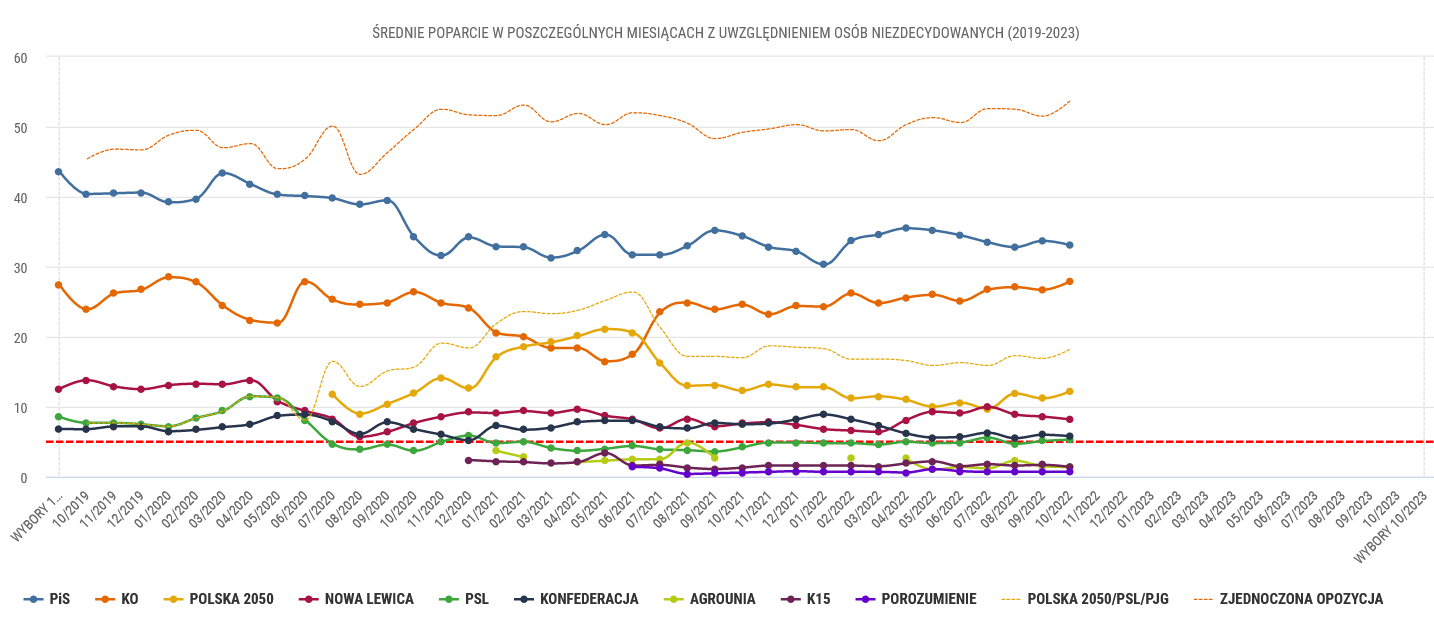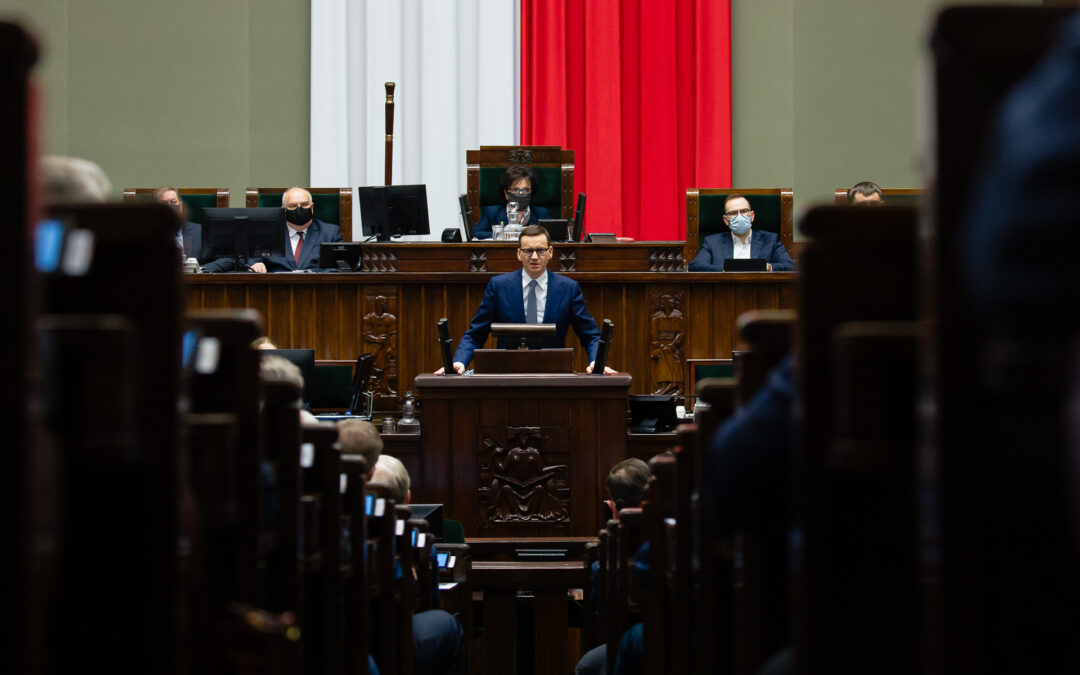Support for the government of Prime Minister Mateusz Morawiecki has fallen to its lowest ever level of 26% in regular polling carried out by state research agency CBOS. The findings come one year ahead of elections at which his Law and Justice (PiS) party will seek an unprecedented third term in office.
Meanwhile, two further surveys show that most Poles blame the government – rather than the EU – for the freezing of Poland’s European funds. Another indicates that support for the main opposition group, Civic Coalition (KO), has overtaken that of PiS, though most polling still shows PiS ahead.
W stosunku do ubiegłego miesiąca nastąpił niewielki ubytek osób przychylnie nastawionych do gabinetu Mateusza Morawieckiego, co skutkuje rekordowo wysoką przewagą jego przeciwników nad zwolennikami. pic.twitter.com/SjP0vEnzWF
— CBOS (@CBOS_Info) October 25, 2022
In its latest study, CBOS found that, while just over a quarter of the public declared themselves supporters of Morawiecki’s government, almost half (47%) described themselves as opponents of it, which is the highest level ever recorded.
Support for the government has been on a generally downward trend since early 2020. Earlier this year, its ratings briefly rose amid a tough response to Russia’s aggression against Ukraine. However, by the summer the decline had resumed.
As well as gauging support for or opposition to the government, CBOS also asked respondents if they have a good or bad opinion of its actions. Over half (56%) said they have a negative view and almost one third (32%) a positive one.
Meanwhile, as inflation remains at 25-year-highs and amid an energy crisis, 62% told CBOS that they do not believe the government’s economic policies create the possibility for an improvement in the situation, while 28% believe that they do.
Further economic concerns have been raised by confirmation last week that the European Commission has not only frozen around €36 billion in Poland’s pandemic recovery funds over rule-of-law concerns, but is also withholding further billions in cohesion funds for the same reason.
While PiS has argued that such concerns lack merit, and accused Brussels of using funds as a political tool to force a change in Poland’s government, two new polls indicate that the Polish public have not been persuaded by such claims.
The first, by SW Research for Rzeczpospolita, asked who is primarily to blame for the EU blocking Poland’s funds. A large majority (60.5%) said that it was the government’s fault while only 9.5% blamed the European Commission. A further 8.6% pointed to the opposition while 6.1% blamed Germany.
🔴 TYLKO U NAS. #Sondaż @SWResearch_pl dla rp .pl: Większość Polaków obwini #rząd za brak pieniędzy z #UE https://t.co/HBv1AumUAJ pic.twitter.com/0OD5SJAA1k
— Rzeczpospolita (@rzeczpospolita) October 22, 2022
The second, by United Surveys for Wirtualna Polska, asked if “the policies of the PiS government regarding relations with the EU and the dispute over the rule of law may lead to Poland receiving no money from the EU?”
Almost three quarters (72.2%) agreed that it could, while less than a quarter (23.4%) were of the opposite view. Even among those who identified as supporters of the ruling camp, 43% thought that its policies could result in no money coming in, while 55% disagreed.
Zapytaliśmy Polaków, czy polityka rządu może doprowadzić do tego, że #Polska nie dostanie żadnych pieniędzy z #UE. Takiego zdania jest aż 72,2 proc. ankietowanych.
✒️ @united_surveys dla @wirtualnapolska pic.twitter.com/1CkNa5xVbb
— Wirtualna Polska (@wirtualnapolska) October 25, 2022
Meanwhile, a new poll of party support by Kantar Public has found that 31% of the public would vote for the centrist KO while 28% favour the national-conservative PiS. It is only the second time this year that any poll has put the largest opposition group ahead of the ruling party.
However, other polling still consistently finds PiS ahead of KO. According to a monthly average of polls by the ewybory.eu aggregator website, in October PiS has 33.1% support (down from 33.7% last month) and KO 27.9% (up from 26.7%).
They are followed by the centrist Poland 2050 (Polska 2050), which is averaging 12.2%; The Left (Lewica) on 8.2%; the far-right Confederation (Konfederacja) on 5.8%; and the agrarian Polish People’s Party (PSL) on 5.3%.

Monthly polling averages for political parties (source: ewybory.eu)
This would mean that the centrist and left-wing opposition of KO, The Left, Poland 2050 and PSL would together receive 53.7% of the vote, according to ewybory.eu. The website calculates that would translate into an opposition majority of 247 seats in the 460-seat lower house of parliament, the Sejm.
Recent months have seen debate among opposition parties over the best formation in which they should approach the parliamentary elections scheduled for autumn 2023.
While Tusk has long pushed for a single, united opposition to stand on a joint ticket, other leaders say they favour forming two or three separate opposition blocs, which would then seek to form a coalition government together after the elections.
Main image credit: Krystian Maj/KPRM (under CC BY-NC-ND 2.0)

Daniel Tilles is editor-in-chief of Notes from Poland. He has written on Polish affairs for a wide range of publications, including Foreign Policy, POLITICO Europe, EUobserver and Dziennik Gazeta Prawna.




















